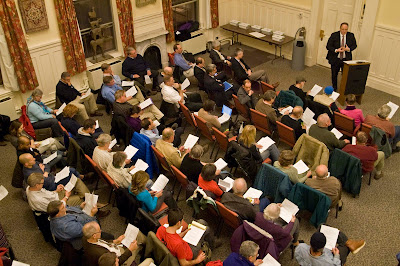In a crowded hall of the Rutland Free Library, a mass of people are huddled together. They are speaking excitedly and directly on this cold Tuesday night in December. This is the health care Listening Session put on by the State to help determine how to finance the upcoming Green Mountain health care program following Governor Shumlin’s signing of the bill into law earlier this year.

Photo by Dylan Kelley
In its journey towards universally affordable health care the state is conducting these listening sessions (part educational slideshow, part discussion) in an awkward but important attempt to gauge how and from where to fund the landmark bill. “This is not the time to re-hash old arguments about the bill’s passage” said Michael Costa, Special Council for the Vermont Department of Taxes as he addressed the murmuring crowd in front of him. “This is the time to discuss how we’re planning to put all this together in time for 2013.”
After Costa’s presentation to those assembled at the library, the crowd divided into small discussion groups to talk about where from and how GMHC should be funded. While most participants eagerly (and even emphatically) engaged in constructive debate, some of those present were bitterly opposed to GMHC at the time of its passage and clearly expressed their continuing malcontent by ripping up the provided discussion materials and refusing to shake hands with other participants at the conclusion of the evening.
While billed as a “listening session” by its organizers, this evening, and others like it, are in actuality much more of a poll of those in attendance about where “the money” should come from to pay for Vermont’s bold plan to ensure affordable access to health care for all. Indeed, several legislators were seen drifting about from one group to the next, but the crux of the night was the distribution of tiny photo-copied dollar bills into various boxes labeled “Property Tax”, “Businesses”, “[Federal] Government” “State” and “Other”. Participants were asked to distribute each of their ten dollar bills into whichever box they felt most appropriate in order to pay for GMHC.
Remarkably, the big winner for the night was the box marked “other”, in which a brief description of the participants’ ideas were written on the reverse side of the bills. Disregarding the tattered pieces of paper that the previously mentioned attendee stuffed into their envelop, the most vocal participants of the night were supporters of the Vermont Workers’ Center whose familiar, and seemingly omnipresent, red “Rosie the Riveter/PUT PEOPLE FIRST” t-shirts were impossible to miss.
With the launch of the “Put People First” campaign, the VWC is championing the goal of the passage of a “People’s Budget” in Montpelier. This goal of part budget, part human rights initiative is designed to place the fulfillment of human and civil rights at the top of Montpelier’s priorities, thereby ensuring that the rest of the state’s business is arrayed to either uphold these rights or prevent their violation. A lofty goal to be sure, but one that is not so improbable as it may have seemed not so long ago.
Photo by Dylan Kelley
The global arrival of the Occupy movement, as well as its significant presence in Vermont has shone a new and powerful spotlight upon inequities and the substantial lost opportunities in the lives of working and middle class Vermonters. In addition to standing in solidarity with Occupy Burlington as well as Occupy encampments around the world, they’re also examining the dangerous situation of Vermont Yankee (a case likely to end up before the Supreme Court) as well as backing Sen. Bernie Sanders’ introduction of a Constitutional Amendment to eliminate corporate personhood in America.
How likely are these? Bernie’s bill will almost certainly fail in an increasingly corrupt Washington, but its worth noting that at their annual conference on December 10th, the VWC, in conjunction with UVM’s stellar Students Stand Up group drew as many as 500 people from across the country. The last time the VWC gather that many of its closest friends it managed to achieve the passage of a bill of Universal health care for all Vermonters at a time when the rest of the nation was mired in Washington brinkmanship and mudslinging.
If these stories from recent memory are anything to go by, and with more and more residents rising with the occasion that is piled so high with difficulty, the Vermont Workers’ Center is not only poised to become a game-changer in the name of Human Rights, not just for tiny Vermont, but for an entire nation.






